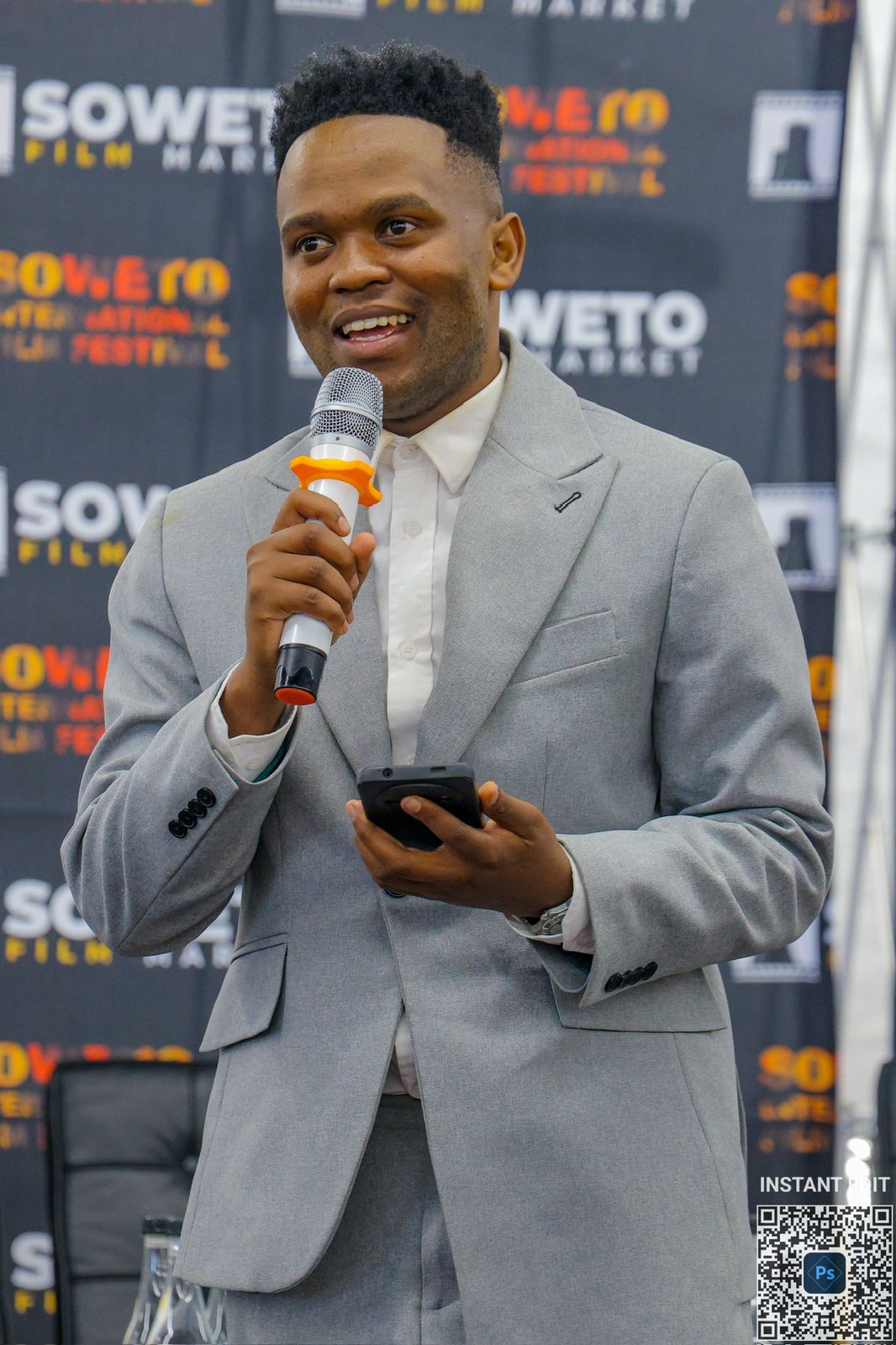Soweto has always been more than a place—it is a living archive of resistance, resilience, and storytelling. From the sound of protest songs to the rhythm of township theatre, it has long been a stage where stories hold the power to move, mobilise, and inspire. Now, in the heart of this cultural powerhouse, filmmaker and visionary Thapelo Motloung is writing a new chapter in South African cinema.
That chapter has just taken on global significance. The Soweto Film Market recently announced a groundbreaking partnership with Meta, Facebook, and Instagram to launch a Mobile Film Workshop for Emerging Content Creators during this year’s Soweto International Film Festival. The three-day programme will equip 200 young filmmakers with the skills and tools to create compelling digital stories using only mobile devices — a reflection of the Film Market’s mission to expand access, break down barriers, and place Soweto at the centre of the global storytelling economy.

Motloung, the founder of the Soweto Film Market, is determined to make the township not only a consumer of cinema but a hub of film innovation, business, and collaboration. With the support of industry icons such as Dr John Kani and Dr Jerry Mofokeng, and an ambitious vision for the future, he is positioning the Market as both a launchpad for emerging filmmakers and a bridge between township talent and the world.
We had a sit-down with Motloung to discuss this exciting collaboration with Meta, the upcoming Soweto International Film Festival, and the future of African storytelling on the global stage.
What inspired you, as a young filmmaker from Soweto, to start the Soweto Film Market?
The inspiration behind the Soweto Film Market came from a deep desire to create access, visibility, and opportunities for local filmmakers in the township space. Growing up in Soweto, I saw so much raw talent and powerful stories that never made it to mainstream platforms, simply because there weren’t enough avenues for showcasing or developing them. I wanted to build a space where the industry could meet the township, where emerging voices could connect with established professionals, and where film could become a tool for both economic growth and cultural pride. The Film Market was born out of that vision to give our stories the platform they deserve and to position Soweto as not just a consumer of film, but as a hub for film creation, collaboration, and innovation.
Soweto has such a rich history of storytelling. How does that legacy influence what you’re building?
It’s Aluta continua in the words of the late Miriam Makeba. We’re building on a rich heritage, on fertile ground, a “Milele” (promised land) of our time, where those who lived before us dreamt of a South Africa that is free. This is us, young and fearless leaders, breaking boundaries, shifting perceptions, and rewriting the negative narrative of a young Sowetan, hosting the world in a township that was once a Bantu camp.
Soweto’s history of resilience and storytelling is at the heart of the Film Market. The township has always been a place of creativity — from the struggle era to today’s cultural scene. That history influences how we build, because we see film not just as entertainment, but as a continuation of Soweto’s tradition of using stories to educate, mobilise, and inspire. Our platform is futuristic, educational, authentic, and honest, creating space for young filmmakers to tell their own narratives while also connecting with the global film industry.

You’ve spoken about gatekeeping in the industry. How do you see the Market breaking down those barriers?
I’ve seen how gatekeeping holds back so much raw talent in our industry. The Soweto Film Market is about breaking those walls down by creating access. We’re giving young filmmakers platforms to showcase their work, to network with industry professionals, and to get practical resources that would normally be out of reach. For us, it’s not about waiting for permission from the “big guys” — it’s about building our own stage and inviting the world to see us. By opening up the Market to local and international voices, we’re showing that you don’t need connections or privilege to be part of the film industry; you need creativity, vision, and a space like ours that believes in you.
Why was it important for you that this happens in Soweto, and not anywhere else?
For me, it was non-negotiable that the Soweto Film Market be rooted right in the heart of Soweto. This place is more than just where I come from — it’s a global symbol of resilience, creativity, and cultural power. Soweto has always carried the essence of storytelling, whether through music, theatre, or oral traditions passed down in our homes. But too often, film as an industry feels distant from communities like ours. By building it here, I’m making a statement that world-class cinema and creative opportunities are available for everyone and anyone to participate in.

The Film Market is about both creativity and business. How do you balance those two worlds?
It’s always about finding harmony between artistic vision and commercial viability. The Film Market offers different programmes such as the film pitch competition, which allows filmmakers the chance to secure investors or buyers. Through our screenings we connect with broadcasters, streaming platforms, and distribution companies such as Paramount Africa and Indigenous Film Distributors. We also run an industry programme that assists with the business side of film.
You have big names like John Kani and Dr Jerry Mofokeng backing the initiative. What does their involvement bring to the festival and the Market?
Dr John Kani is not just a big name to me but my personal mentor. His involvement is mostly on an advisory level, giving guidance on important decisions. Dr Jerry Mofokeng is also a patron and advisor for the activities within the festival. Their presence brings wisdom, credibility, and a sense of continuity between the pioneers of our film industry and the next generation.
What can audiences and filmmakers look forward to at this year’s Soweto International Film Festival?
This year’s Festival is going to be an unforgettable experience, not just for film lovers but for the entire creative industry. Audiences can look forward to a dynamic programme that includes powerful local and international screenings, panel discussions with leading voices from the global film community, and opportunities to engage directly with filmmakers. The festival is more than just about watching films — it’s about creating conversations, building networks, and opening doors.
For filmmakers, the Soweto Film Market alongside the Festival offers a platform to showcase their work, connect with distributors and investors, and gain access to mentorship and industry expertise. We’re making sure that creativity and business meet in one space, so that a film made in Soweto can find its way onto the world stage.

You’re not just a founder but also an actor, producer, and presenter. How have those experiences shaped your vision?
Wearing different hats in the industry has definitely shaped the way I built the Soweto Film Market. As an actor, I know the struggles of wanting your talent to be seen and taken seriously. As a producer, I understand the behind-the-scenes challenges — from funding to distribution — that often limit great stories from reaching audiences. And as a presenter, I’ve learned the importance of engagement, connection, and packaging stories in a way that resonates with audiences.
All those experiences taught me that the industry is not just about talent but about opportunity. That’s why my vision for the Soweto Film Market is to create an environment where creativity and business collaborate, where a filmmaker doesn’t only dream about telling their story but also has access to the tools and networks to execute it and showcase it globally.
In five years, what would success for the Soweto Film Market look like to you?
In five years, I envision the Soweto Film Market as a premium African cinema festival, providing local filmmakers with access to resources, funding, and global exposure. Our goal is to launch the careers of emerging storytellers into international spaces while preserving the authentic voices of our township community.
It would also mean having sustainable partnerships with broadcasters, investors, and global festivals, so that the Market is not just an annual event but an ongoing ecosystem.

